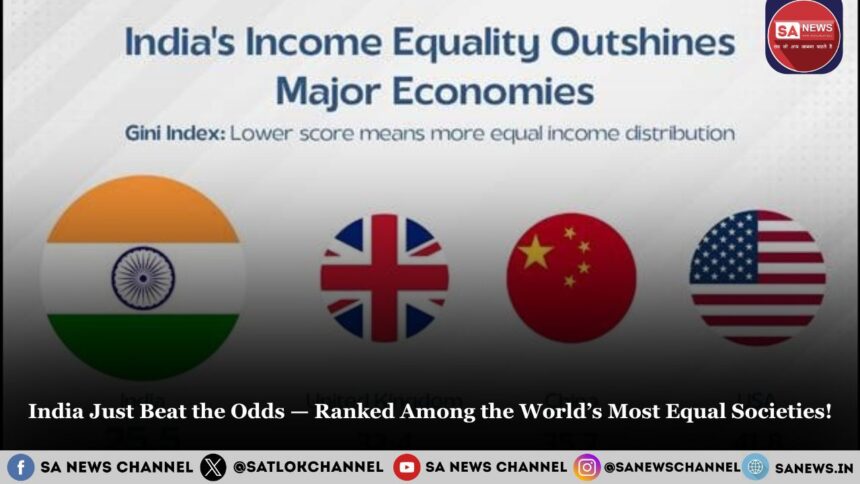Did you ever imagine that a country as vast, diverse, and complex as India would rise to be among the top nations in ensuring social equality? In a remarkable recognition, the World Bank has ranked India fourth in the world for achieving social equality. This isn’t just a number on a list—it reflects decades of reform, action, and ambition. It tells the story of millions of Indians who have worked tirelessly for a more inclusive and fair society.
This global recognition marks a turning point in India’s journey—a moment to reflect on how far we’ve come and where we’re headed.
Breaking Down the Achievement
India’s high ranking is not a matter of luck. It is the outcome of long-term, consistent progress across several critical areas: education, healthcare, and inclusive economic policies. Together, these have helped lay the foundation for a more equal society.
Education Reforms Reaching the Margins
In recent years, India has focused heavily on making education accessible to all. From remote villages in the northeast to tribal regions in central India, schools and colleges have been expanded to bring learning closer to every doorstep. Government schemes like Sarva Shiksha Abhiyan and Beti Bachao, Beti Padhao have ensured that education is no longer a privilege of the few but a right for all, especially for girls and disadvantaged communities.
Healthcare for All
The Indian government’s health initiatives have revolutionized access to medical care. Programs like Ayushman Bharat, one of the largest health insurance schemes globally, have given millions of low-income families access to quality treatment. Rural health missions and wellness centres are now ensuring that even small villages have access to essential medical services, reducing the urban-rural healthcare divide.
Welfare for Marginalized Communities
Historically marginalized groups such as Scheduled Castes (SC), Scheduled Tribes (ST), and Other Backward Classes (OBC) have been supported through targeted welfare schemes, financial assistance, skill development, and reservations in education and employment. These initiatives have helped close historical gaps in opportunity and representation.
A Long Journey with Many Milestones
India’s social fabric is complex. From caste hierarchies to gender biases, from income disparity to rural-urban divides, the challenge of equality has always been multifaceted. However, India’s democratic structure, active civil society, and continuous governmental efforts have led to inclusive growth, which is now being acknowledged on a global scale.
The journey has not been easy. But the result—a more equitable society—is slowly becoming visible.
Importantly, this global recognition is not the end but a milestone in the ongoing journey toward equality.
Why Does This Matter?
In a world where inequality continues to widen in many parts of the globe, India stands out as a country proving that economic growth and social justice can go hand in hand. This achievement is not just symbolic; it is a powerful message that development is meaningful only when it reaches the last person in the line.
India’s case also serves as a model for other developing countries—proving that democratic governance, inclusive policies, and public participation can lead to measurable gains in social equality.
The Road Ahead
Despite the progress, India still faces several challenges:
- Regional imbalances in development between states
- Gender inequality, particularly in workforce participation and safety
- Digital divide that limits access to knowledge and opportunities
These are areas that need focused attention and urgent reforms. However, with political will, technological innovation, and public involvement, these challenges are not insurmountable.
A Vision for the Future
Looking forward, India has the potential to become a global leader in social equality, not just by numbers but through actions that create real, sustainable impact. The path involves continuing investments in education, healthcare, digital access, gender equity, and most importantly, strengthening the voice of every citizen.
In Conclusion
India’s fourth-place global ranking in social equality is more than just international recognition—it is a validation of the country’s inclusive vision and tireless effort.
It reminds us that in a nation as large and diverse as India, equality is no longer an unreachable goal. With every policy designed with equity in mind, every citizen empowered, and every underprivileged community uplifted, India is steadily moving toward its true potential—a fair, just, and united society.
The journey is far from over, but the direction is right. And that, indeed, is a moment of pride.
Divine knowledge is inspiring real-world change
According to the divine wisdom of Sant Rampal Ji Maharaj, genuine equality emerges when all people see themselves as children of one Supreme God—Kabir Sahib Ji. Caste, religion, wealth, and status are mere illusions that create separations. Maharaj Ji teaches that every soul is equal in God’s eyes, and only through Satbhakti—true devotion rooted in scriptures—can society find lasting unity and peace.
The recent acknowledgment of India as one of the most equal societies highlights this profound truth. When people adopt spiritual reform, discard harmful traditions, and live according to scriptures, social harmony follows naturally. Sant Rampal Ji Maharaj’s goal is to create Ram Rajya, where justice, compassion, and equality thrive—not only socially but also spiritually—allowing every being to live with dignity and achieve salvation.
To know more visit Sant Ramapl Ji Maharaj Youtube Channel or visit Sant Rampal ji maharaj website









